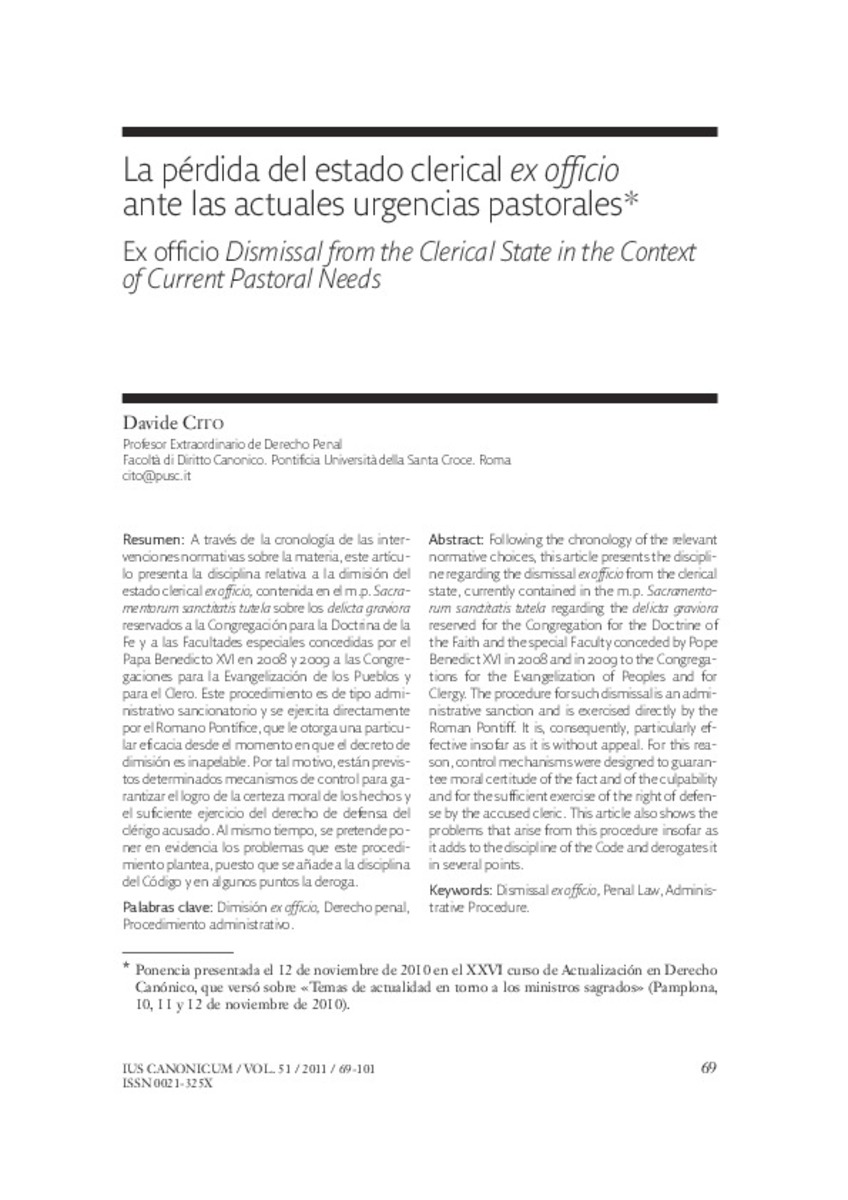Full metadata record
| DC Field | Value | Language |
|---|---|---|
| dc.creator | Cito, D. (Davide) | - |
| dc.date.accessioned | 2014-08-22T12:12:32Z | - |
| dc.date.available | 2014-08-22T12:12:32Z | - |
| dc.date.issued | 2011 | - |
| dc.identifier.citation | IUS CANONICUM, 2011, 51, N. 101, págs. 69-101. | es_ES |
| dc.identifier.issn | 0021-325X | - |
| dc.identifier.uri | https://hdl.handle.net/10171/36361 | - |
| dc.description.abstract | A través de la cronología de las intervenciones normativas sobre la materia, este artículo presenta la disciplina relativa a la dimisión del estado clerical ex officio, contenida en el m.p. Sacramentorum sanctitatis tutela sobre los delicta graviora reservados a la Congregación para la Doctrina de la Fe y a las Facultades especiales concedidas por el Papa Benedicto XVI en 2008 y 2009 a las Congregaciones para la Evangelización de los Pueblos y para el Clero. Este procedimiento es de tipo administrativo sancionatorio y se ejercita directamente por el Romano Pontífice, que le otorga una particular eficacia desde el momento en que el decreto de dimisión es inapelable. Por tal motivo, están previstos determinados mecanismos de control para garantizar el logro de la certeza moral de los hechos y el suficiente ejercicio del derecho de defensa del clérigo acusado. Al mismo tiempo, se pretende poner en evidencia los problemas que este procedimiento plantea, puesto que se añade a la disciplina del Código y en algunos puntos la deroga. | es_ES |
| dc.description.abstract | Following the chronology of the relevant normative choices, this article presents the discipline regarding the dismissal ex officio from the clerical state, currently contained in the m.p. Sacramentorum sanctitatis tutela regarding the delicta graviora reserved for the Congregation for the Doctrine of the Faith and the special Faculty conceded by Pope Benedict XVI in 2008 and in 2009 to the Congregations for the Evangelization of Peoples and for Clergy. The procedure for such dismissal is an administrative sanction and is exercised directly by the Roman Pontiff. It is, consequently, particularly effective insofar as it is without appeal. For this rea- son, control mechanisms were designed to guarantee moral certitude of the fact and of the culpability and for the sufficient exercise of the right of defense by the accused cleric. This article also shows the problems that arise from this procedure insofar as it adds to the discipline of the Code and derogates it in several points. | es_ES |
| dc.language.iso | spa | es_ES |
| dc.publisher | Instituto Martín de Azpilcueta | es_ES |
| dc.rights | info:eu-repo/semantics/openAccess | es_ES |
| dc.subject | Dimisión ex officio | es_ES |
| dc.subject | Derecho penal | es_ES |
| dc.subject | Procedimiento administrativo | es_ES |
| dc.subject | Dismissal ex officio | es_ES |
| dc.subject | Penal Law | es_ES |
| dc.subject | Administrative Procedure | es_ES |
| dc.title | La pérdida del estado clerical ex officio ante las actuales urgencias pastorales | es_ES |
| dc.title.alternative | Ex officio Dismissal from the Clerical State in the Context of Current Pastoral Needs | es_ES |
| dc.type | info:eu-repo/semantics/article | es_ES |
| dc.identifier.doi | 10.15581/016.51.2594 | es_ES |
Files in This Item:
Statistics and impact
Items in Dadun are protected by copyright, with all rights reserved, unless otherwise indicated.






